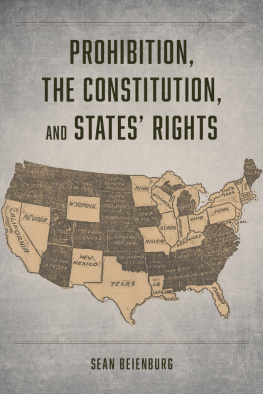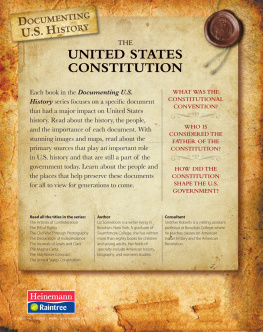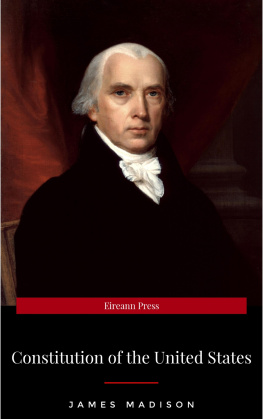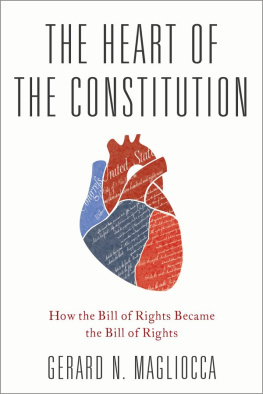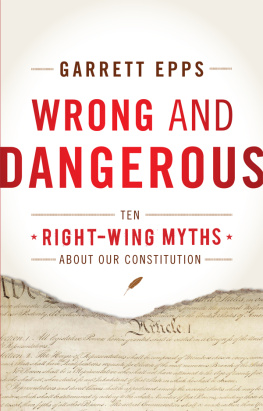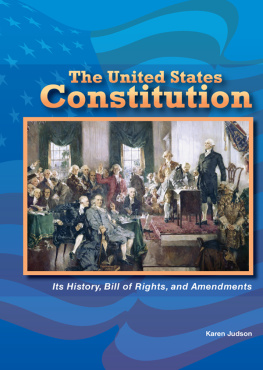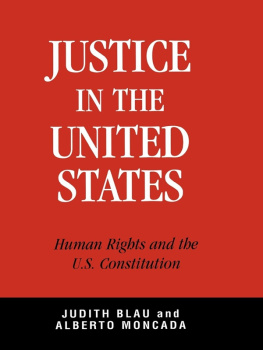The University of Chicago Press, Chicago 60637
The University of Chicago Press, Ltd., London
2019 by The University of Chicago
All rights reserved. No part of this book may be used or reproduced in any manner whatsoever without written permission, except in the case of brief quotations in critical articles and reviews. For more information, contact the University of Chicago Press, 1427 E. 60th St., Chicago, IL 60637.
Published 2019
Printed in the United States of America
28 27 26 25 24 23 22 21 20 19 1 2 3 4 5
ISBN -13: 978-0-226-63194-3 (cloth)
ISBN -13: 978-0-226-63213-1 (paper)
ISBN -13: 978-0-226-63227-8 (e-book)
DOI : https://doi.org/10.7208/chicago/9780226632278.001.0001
Library of Congress Cataloging-in-Publication Data
Names: Beienburg, Sean, author.
Title: Prohibition, the Constitution, and states rights / Sean Beienburg.
Description: Chicago ; London : The University of Chicago Press, 2019. | Includes bibliographical references and index.
Identifiers: LCCN 2019002015 | ISBN 9780226631943 (cloth : alk. paper) | ISBN 9780226632131 (pbk. : alk. paper) | ISBN 9780226632278 (e-book)
Subjects: LCSH : ProhibitionUnited StatesHistory20th century. | Federal governmentUnited StatesHistory20th century. | ProhibitionPolitical aspectsUnited StatesHistory20th century. | United States. Constitution. 18th amendment. | United States. Constitution. 21st amendment.
Classification: LCC KF 3919 . B 45 2019 | DDC 344.7305/41dc23
LC record available at https://lccn.loc.gov/2019002015

This paper meets the requirements of ANSI / NISO Z 39.48-1992 (Permanence of Paper).
Among my tasks during my postbaccalaureate fellowship year was helping assemble a volume of essays, a line from which sticks with me to this day: Human beings are not born free, but indebted; their identities are more defined by what they owe than by what they own. With that in mind, I begin by acknowledging some of those to whom I am so indebted, both professionally and personally.
During the course of this project I received generous financial support from the Miller Center at the University of Virginia (under Brian Balogh), the Institute for Humane Studies, Lehigh University, and Princetons Program in American Studies. I also thank the staff at the Firestone Library and particularly the Wisconsin Historical Societyan essential resource for anyone researching state politics.
I commenced the early part of this research at Princeton, alongside folks devoted to helping a developing scholar to whom I remain very grateful. Paul Frymer has been the ideal mentor: a supportive friend who is happyindeed, eagerto comment on work and let me stop by to bounce ideas off of him (even when hes visibly swamped) and doggedly committed to ensuring his students succeed in the way theynot hewant to. Keith Whittington is incredibly generous in sharing his peerless knowledge of American political history, federalism, and constitutional theory as well as wry conversations on politicsnow, shockingly, online. Dirk Hartog laughed once that his main contribution to the project was directing me to the Wisconsin Historical Society state collection. While that certainly helped, he has also been extremely generous in treating a political science interloper as a fellow historian and providing incredibly detailed feedback. Omar Wasow offered helpful counsel, especially on the racial politics underlying prohibition. I also benefited greatly from conversations with Chris Achen, Robby George, Phil Wallach, Sean Wilentz, and Brad Wilson, who all helped make Princeton a vibrant place to discuss constitutionalism.
I also received much helpful feedback on this project from Richard Bensel, John Dinan, Mark Graber, Paul Herron, Ken Kersch, Helen Knowles, Rick Matthews, Alan Tarr, Rebecca Zietlow, Michael Zuckert, and the two anonymous reviewers. Chuck Myers and Holly Smith have been every bit the helpful and patient editors one would want.
Some of this material has been presented at meetings of the American Political Science Association, the New England Political Science Association, the Law and Society Association, and Policy History. I thank the Jack Miller Center and American Political Thought for allowing me to incorporate material from my Neither Nullification nor Nationalism: The Battle for the States Rights Middle Ground during Prohibition, American Political Thought 7 (2018): 271303, 2018 by the Jack Miller Center.
My study of constitutional and legal development was cultivated by passionate professors, specifically Phillip Argento, Justin Crowe, Gary Kates, Charles Lofgren, Robert Woods, and especially Susan McWilliams.
As Ecclesiastes 12:12 observes: Of making many books there is no end, and much study wearies the body. A few family and friends are owed a lot of gratitude for their especially generous support during my academic career. Of my extended family, Bruce and Joanne McCallum, Cara McCallum, Stephanie Sullivan, and Brad Grandy warrant special thanks. So do several friends, from grad school, college, and before: Richard Jordan, Ross Williford, Herschel Nachlis, Alexander Haines (who volunteered to read the manuscript for a nonacademics perspective), Steven Hurtado, Alistair Rockoff, James Stake, Trevor Lagers, Jordan Perry, and Joe Wachtel.
My brother, Matt Beienburg: I consider myself very fortunate indeed that our paths could cross twice more after Phoenix, first in Claremont and then Princeton, before now reconvening back in Arizona. In addition to being the mapmaker and a reader for this book, he has always been, and I hope will continue to be, my most treasured conversationalist and my closest adviser, with perhaps one exception.
Matt and I were raised by our grandparents and, after the death of my grandfather, Steve Beienburg, by my grandmother, Helen. Raising two boys alone was not exactly the plan for quiet retirement she anticipated, which makes her many sacrifices on our behalf all the more appreciated. Years ago, in conversation a few weeks before we both finished graduate school, Matt and I both acknowledged that any successes we have are due to her and our failures in spite of her, and I have since wanted to put that in writing that she and others might see it. That both Matt and I ended up working in the realms of politics and education is a result of her teaching us to cherish the value of civic knowledge in preserving a well-functioning constitutional republic. I hope she will find this project a fitting tribute.
Ditat Deus.
 This paper meets the requirements of ANSI / NISO Z 39.48-1992 (Permanence of Paper).
This paper meets the requirements of ANSI / NISO Z 39.48-1992 (Permanence of Paper).
